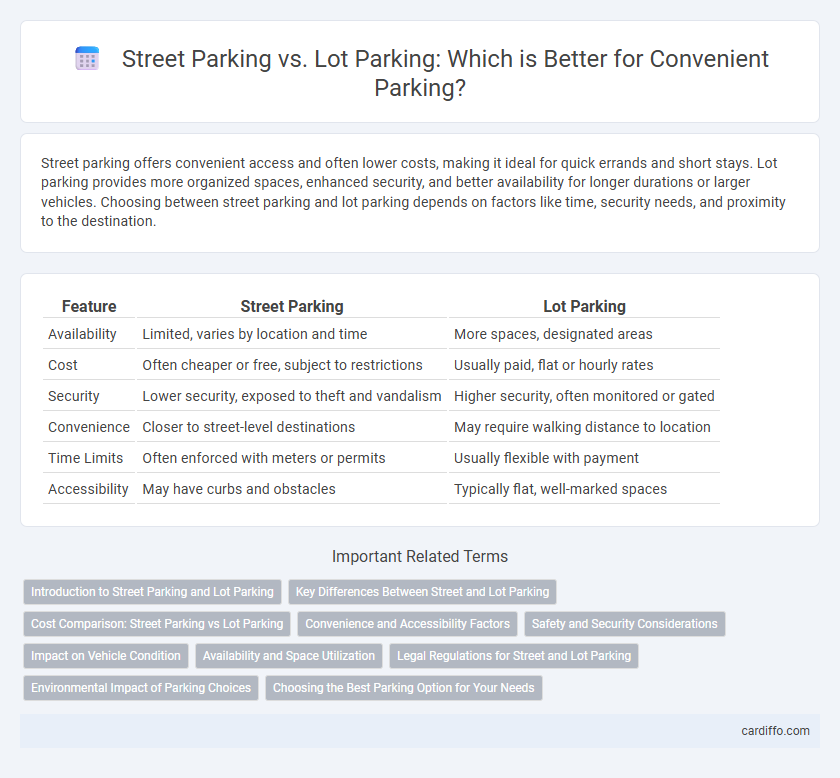Street parking offers convenient access and often lower costs, making it ideal for quick errands and short stays. Lot parking provides more organized spaces, enhanced security, and better availability for longer durations or larger vehicles. Choosing between street parking and lot parking depends on factors like time, security needs, and proximity to the destination.
Table of Comparison
| Feature | Street Parking | Lot Parking |
|---|---|---|
| Availability | Limited, varies by location and time | More spaces, designated areas |
| Cost | Often cheaper or free, subject to restrictions | Usually paid, flat or hourly rates |
| Security | Lower security, exposed to theft and vandalism | Higher security, often monitored or gated |
| Convenience | Closer to street-level destinations | May require walking distance to location |
| Time Limits | Often enforced with meters or permits | Usually flexible with payment |
| Accessibility | May have curbs and obstacles | Typically flat, well-marked spaces |
Introduction to Street Parking and Lot Parking
Street parking offers convenient access along public roads, typically regulated by local ordinances and meters, making it ideal for short-term stays in urban areas. Lot parking provides designated spaces within privately or publicly owned lots, often featuring controlled entry, payment systems, and longer-term options. Choosing between street and lot parking depends on factors like location, duration, cost, and availability.
Key Differences Between Street and Lot Parking
Street parking offers direct access along public roads with variable availability and time restrictions, often regulated by municipal codes and meters. Lot parking provides designated spaces within private or commercial areas, typically featuring controlled entry, fixed rates, and enhanced security measures. Differences in convenience, cost, and enforcement methods significantly impact user preference between street and lot parking options.
Cost Comparison: Street Parking vs Lot Parking
Street parking typically offers lower hourly rates or free options compared to lot parking, which often charges higher fees due to security and maintenance costs. Lot parking provides benefits such as designated spaces and increased safety, justifying the premium price in many urban areas. Cost efficiency depends on location, duration, and demand, with street parking favored for short-term stays and lot parking preferred for longer durations or guaranteed availability.
Convenience and Accessibility Factors
Street parking offers higher convenience for quick stops and proximity to specific destinations due to its location along busy roads and urban centers. Lot parking provides greater accessibility with designated spaces, better security, and often easier ingress and egress, making it ideal for longer stays or when carrying heavy items. Both options vary in availability and cost, influencing user preference based on immediate need and parking duration.
Safety and Security Considerations
Street parking often presents higher risks due to limited surveillance and increased exposure to traffic hazards, making vehicles more vulnerable to theft or vandalism. Lot parking typically offers enhanced security features such as controlled access, lighting, and surveillance cameras, which significantly reduce the likelihood of criminal activity. Choosing a well-monitored parking lot can greatly improve vehicle safety and provide peace of mind for drivers.
Impact on Vehicle Condition
Street parking exposes vehicles to environmental elements such as pollution, bird droppings, and fluctuating temperatures, which can accelerate paint deterioration and rust formation. Lot parking typically offers a cleaner environment with reduced exposure to these damaging factors, helping preserve the vehicle's exterior condition. Frequent use of street parking increases the risk of minor dents and scratches from passing traffic and pedestrians, whereas lot parking tends to minimize such physical damages.
Availability and Space Utilization
Street parking often offers limited availability due to traffic regulations and curbside restrictions, resulting in lower space utilization efficiency. Lot parking provides designated spaces that maximize vehicle capacity with organized layouts, increasing availability, especially in busy urban areas. Efficient space utilization in lots reduces search time for parking, enhancing convenience and traffic flow compared to scattered street parking options.
Legal Regulations for Street and Lot Parking
Street parking regulations often include time limits, permit requirements, and specific restrictions related to residential zones or commercial areas, enforced by local municipalities to prevent congestion and ensure safety. Lot parking typically involves private property rules, payment obligations, and clear signage dictating duration, vehicle types, or designated spaces, compliant with local zoning laws and insurance regulations. Both parking types must adhere to state and city ordinances, with violations potentially resulting in fines, towing, or penalty points on driving records.
Environmental Impact of Parking Choices
Street parking generally has a lower environmental impact compared to lot parking because it utilizes existing curb space, reducing the need for additional land development and impervious surfaces that contribute to runoff and habitat loss. Lot parking often requires larger paved areas that increase heat island effects and promote higher vehicle emissions due to dispersed layouts and longer walking distances. Choosing street parking can also encourage more efficient space use and minimize urban sprawl, supporting sustainable city planning efforts.
Choosing the Best Parking Option for Your Needs
Street parking offers convenience and proximity to specific destinations, often with shorter walking distances and easy access to urban areas. Lot parking typically provides more space, enhanced security features, and reduced risk of street-related damages or restrictions, making it suitable for longer stays or overnight parking. Evaluating factors such as duration, safety, cost, and accessibility ensures the best parking option aligns with your practical needs and preferences.
Street Parking vs Lot Parking Infographic

 cardiffo.com
cardiffo.com